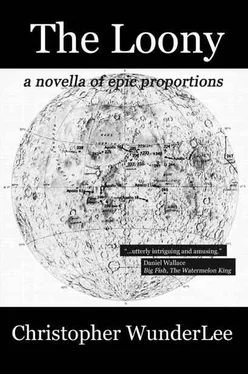Another thud, Albert considered ignoring it. But then, they came from two different sides. Two busy bodies bothering him, actually three. They were struggling with the latch, playing a floating game of charades, trying to get Albert to unlock the door. He thought it best to wave and feign confusion. “What?” he mouthed. He shrugged as the hero stabbed his finger at the lock, shaking his head and grimacing. “I really don’t know what you want,” he said aloud. It sounded strange, tunneled, buried. The back window gave way, the second daredevil’s leg protruding into the cabin. A swirl of red blood cycloning around the pink stump as he retrieved it and tried to break away the rest of the glass. Sharks, now we’ll have sharks. It serves them right. Albert thought all of California was infested with sharks. That’s what the paper said, anyway. He held steadfast to his lapbelt as the young man rode a wave of invading water into the now exposed inside of the car and tried to pull him out. “Oh no,” Albert said, releasing a bevy of air balloons, in which, he was quite sure, he saw several of his more innocuous thoughts written out in black lettering. But the hero won their wrestling match for the release lever, even after Albert slapped his hand away a good three or four times, and felt himself dragged, he wasn’t about to help, bump, bump, a good one on the forehead against the roof, out of his lovely Valiant.
Both men emerged from the waves choking and coughing and treaded water. Albert pretended to be out cold. Otherwise, how could he explain his behavior? He felt the man grip his chest and begin to swim to shore, where, he snuck a quick look, stood a gaggle of witnesses, all pointing and somewhat cheering, some one had started clapping, what a televised nation they were, as the young man tugged him closer and closer. He felt the earth come up to meet him, they were on solid ground, he limply crawled along with his savior, still partially submerged. The on-lookers stepped out into the waves and Albert was lifted onto the beach. He played possum.
By the time the leaves turned amber and marmalade and began dropping in swift, dangling flummery onto the parched earth, Albert was back in New England, long since forgetting his plunge into the Pacific, and beginning what was already a controversially castrophenic career in the high sciences after ignorantly (not accepting such a vainglorious notion of innocence) proposing a solution to the Mead Equation that mimicked nearly perfectly Professor Ernest Pumpernickel’s close call of the 20’s. Almost disrobed of his honors, Albert recovered from the controversy during his senior year by publishing a groundbreaking article in The Ivy Journal of Planck’s Legacy in which he proposed that black holes were actually not conic cavities in the time/space continuum, but flaws in the fabric of space. Thus, their inconvenient way of being incalculable; Albert likened the enormous light suckers to wrinkles in a newly laundered black wool blanket, providing shadows in space, not the complete absence of it. Of course, the notion was attacked vigorously by the astrophysical community, who thought such an unpretentious idea was laughable, except that it warranted some renewed investigation in the curvature of the four dimensions of warped space/time. However, the amount of responses inversely propelled Albert into the limelight, his theories on the escape velocities of stars and the gravitational fields being drawn into them, later to be visible through a responsive, reactive knoll nearby, likened to the theory of “white holes,” save that Albert gave space/time a current-like consistency rather than a vacuous nothingness that had been so prevalent, therefore, Albert proposed that the ether moved in absent tides, in which light was invisible briefly, garnered attention throughout the scientific community.
Known hence forth as a quantum heretic, Albert was left in a strange limbo, his ideas were discussed to a great extent; however he, himself, the boney awkward man with the argyle bow tie and starched opposing patterned shirt, with large mordant eyes cradling chatoyant pupils, Cyrano nose, and ashy teeth, who so many considered the personification of floccinaucinihilipilification, was greatly ignored. He would hear colleagues discussing for instance his assertion that time, like light, inherently had a particle/wave duality, that it was simultaneously finite, structured, and negligible while being observed to have progressive disturbances propagated without displacement of the media. However, as soon as the good doctor attempted to engage his confreres, to initiate a dialogue with them, he quickly found himself feeling like a ventriloquist. People listened to the dummy, the artificial construct, the abstract fool, but had no use for the actual creator and so, his theories dandled upon his lap in the lonely spotlight. His conceptual fame amongst the elitist circles of Bohr’s boys did little to impress the wanton young girls parading around campus with inviting flesh, not a single one found his scientific sacrilege worth moving her quadriceps, nor did it bring any young disciples to sit at his lonely table awaiting the H 20 to get funky.
This only perpetuated dear Albert’s assault on scientific dogma and before long, as he entered into the year after his master’s thesis (ostensibly on the subject of certain children’s toys proving Einstein’s General Theory of Relativity by measuring the shady gravitomagnetic force), the practical applications of having a pariah of his caliber in on the more theoretical experiments the university was entertaining at the behest of the military-industrial complex (who donated enormous sums to the department) caused several faculty researchers to recruit him rather vigorously. The first to approach Albert was Dr. Wilma Brecht, an aging, German-born physicist who had immigrated to the US of A shortly after World War II and who headed up the Conceptual Applications of Random Phenomena Department (and allegedly ran the whole show with a zealous gestapo fervidness). Dr. Brecht remembered Albert from his rather colorful dissertation given a few months before and had been quite impressed by the young rogues willingness to turn a very serious rite into a rather mocking, albeit intellectually stimulating, affair, after Albert turned the floor into what appeared to be, for all intensive purposes, a child’s romper room after a very giving birthday party. However, Albert weathered the snorts and barbs with a certain indifference, even as he setup small stairs and discussed the successive undulation of a slinky as a metaphor for the ribbon of time, or when he couldn’t get the gyroscope to spin properly after several attempts and amidst a cacophony of coughs and uncomfortable farts. He proved his point and furthermore, made a memorable impression on several key faculty members. All of who, at some point, indicated their willingness to offer the young scientist a place in their labs.
And so, Albert spent his PhD years as an associate researcher on Dr. Brecht’s Fenris Project, which had the rather lofty aim of proving order was inherent in complete randomness and therefore, could be quantified and even, predicted. Thus, the raging wolf of chaos could be confined by theoretical chains, and maybe even domesticated. This was also around the time that Albert published his avant-garde paper The Waves of Cosmic Equanimity , in which he proposed that the universe was expanding not in a gradual and uninterrupted manner, but rather, moving in great spurts and stops, in what he called Defined Equipoise. The theory was so outrageous, most astrophysicists simply shrugged or snorted, some treated it with light retorts thick with a condescending tone, while a small cadre of the more conceptual of their lot, lauded its ingenuity. The theory would have died in the pages of the small, greatly ignored Violet Lurch Quarterly , except that it just so happened to be a slow month at The Bean Town Crier ’s science desk and a Randian journalist with his mind set on making it out of the dry, bi-weekly supplement, touted Albert’s new hypothesis like it was Darwin’s dodgy brainchild aboard the Beagle . He wrote up a lengthy feature, which was later picked up by several national dailies and monthly periodicals. From there, things blue shifted bigger than the word of god, and Albert was all over the place, sitting in on discussions, defending his supposition, delivering lectures, and turning down symposiums, even appearing briefly on a local morning show called Rouse Yourselves Big Mass , before the university itself decided to host a dinner gala in his honor.
Читать дальше












